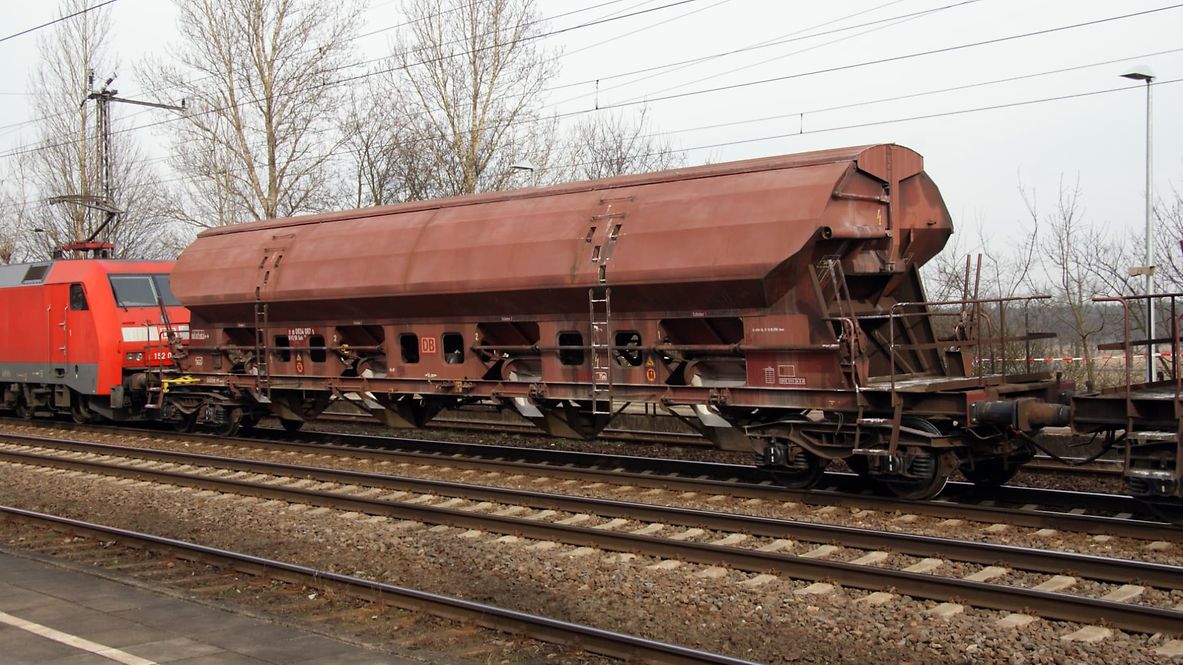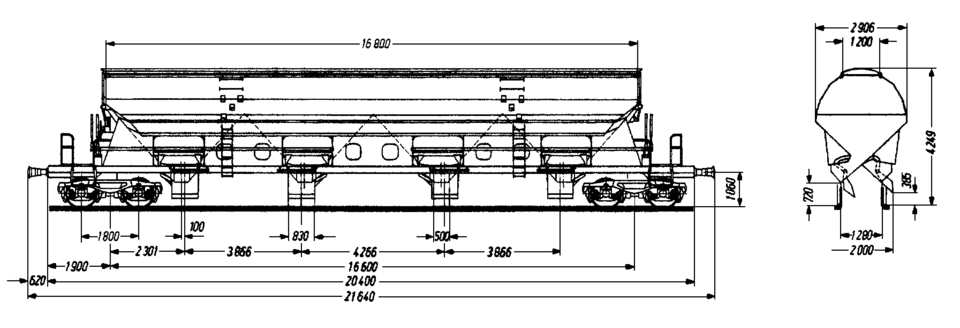Article: Tads 960
Covered bulk freight wagons with controlled gravity unloading and four wheelsets. These wagons are suitable for transporting bulk goods that need to be protected from the weather. Example cargoes are quartz sand, dolomite, anthracite, gypsum stone, lime, wood pellets, petroleum coke, kaolin and paraffin. Loading takes place via a one-part lateral sliding roof. They are equipped with a trackside discharge device that allows for controlled unloading of the freight. Some of the wagons are equipped with special seals on the discharge chutes for transporting quartz sand.
Please note: For exact dimensions, please refer to the drawing and the data below.
Technical details
Loading space (m3) | 80.0 |
Inside width of hopper (mm) | 1,200 |
Inside length of hopper (mm) | 16,800 |
Average tare weight (kg) | 25,000 |
Maximum speed (km/h) | 120 |
International usability | RIV |
Smallest radius of curvature (m) | 75 |
First year of delivery or year of construction of the oldest wagons at this time | 1973 |
Parking brake | Without parking brake |
Brake type | KE-GP |
Number of brake cylinders (pcs.) | 1 |
Brake cylinder diameter (mm) | 406 |
Type of load-proportional braking | Two-stage, mechanical, to be changed over manually |
Buffer type: end force (kN) | 590 |
Buffer type: stroke (mm) | 105 |
Buffer head dimensions (mm) | Avg 450 |
Automatic coupler | Prepared |
Distributor valve type | KE 1a/3.8 SL |
Individual data
Width of the fixed discharge chutes (mm) | 500 |
Width of the swivelling discharge chutes (mm) | 831 |
Load limits
Tare weight > 24.5 t ≤ 25.0 t
Without parking brake
A | B1 | B2 | C | |
|---|---|---|---|---|
S | 39.0 t | 47.0 t | 47.0 t | 55.0 t |
Additional information:
The wagons of type Tads 960 have been created by re-designating the type Tadgs 959. It is suitable for transporting fine-grained, moisture-sensitive bulk goods, especially quartz sand, due to its special slide valve seal. The transport of coarse-grained or angular, heavy bulk goods (e.g. gravel, slag, ballast) is not permitted due to possible damage to the inner coating.
The wagon can be unloaded either to one side or the other, or to both sides simultaneously. The controllable discharge rate enables unloading onto conveyor belts. The swivelling discharge chutes allow the wagon to be used for unloading in bunkers or onto lateral conveyor belts.
The underframe is welded from rolled steel sections (St 52-3). The wagon body is also welded. St 52-3 with added copper has been used for the 3 mm thick body plates.Four eccentrically mounted rotary valves are positioned in each side wall. Each valve can be opened and closed individually with a hand lever from the platform.
The bottom edges of the fixed discharge chutes are 720 mm above top of rail when the wagon is empty. The bottom edges of the movable discharge chutes are 385 mm above top of rail when swung out with the wagon empty.
To load the wagon, the lateral sliding roof is opened from the operating platform with a hand wheel. This exposes an opening with a width of 1,200 mm that extends the entire length of the wagon. The open roof remains within the vehicle gauge so that shifting movements are possible even when the lateral sliding roof is open.
Cargo residues may only be removed from the loading or unloading lane by lightlyknocking on the outer container walls with a rubber hammer or by using air blow lances in the loading space!
For the operation of the wagons, RIL 975.9570 must be observed.

